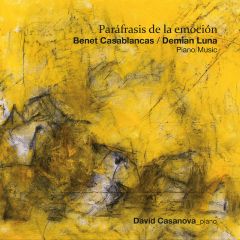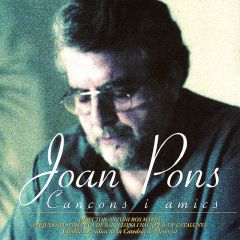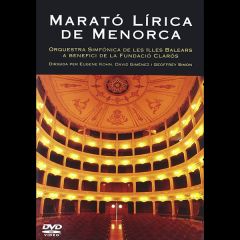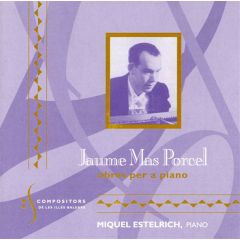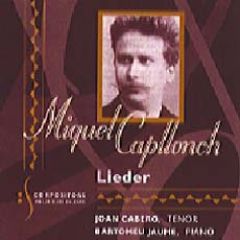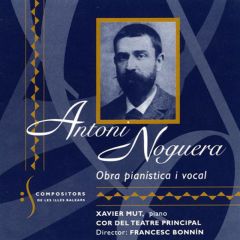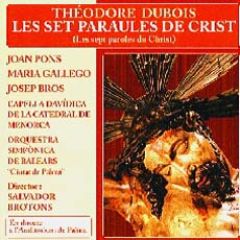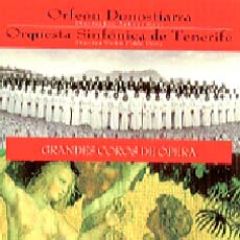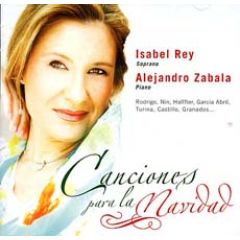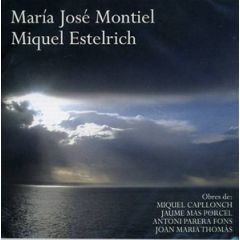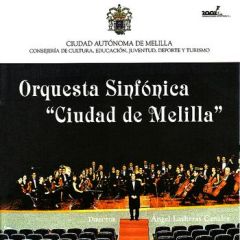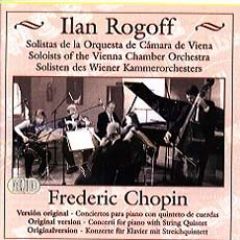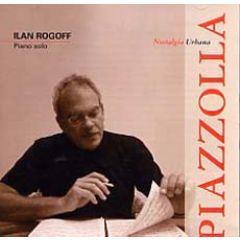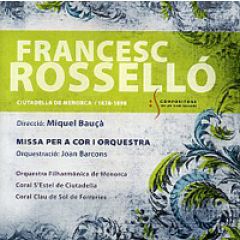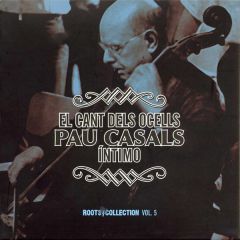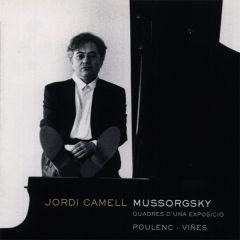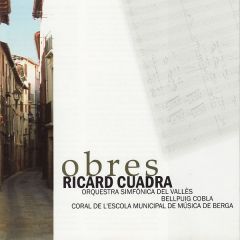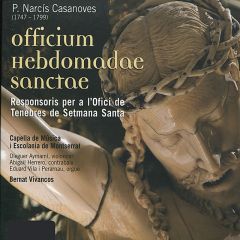FICHA PRODUCTO
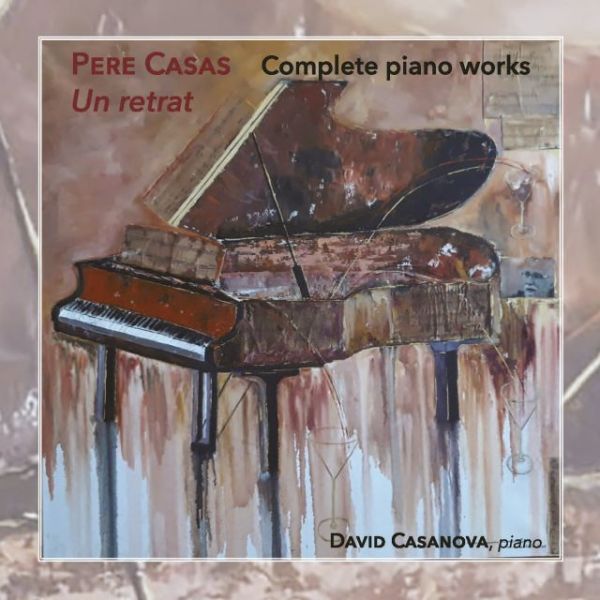
Pere Cases. Complete piano Works. Un retrat
DAVID CASANOVA
CD
CLASSICAL / CONTEMPORARY
COLUMNA MUSICA (COM0450 02)
8429977104504
The CD aims to cover all the works of the Catalan composer, Pere Casas (Terrassa, 1957). From his first work Carrusel in 1987 to the
last of them, In memòria est... from 2019; his breadth of music for piano comprise more than 30 years of work by one of the most
personal and original composers of today.
His gamut of music can be divided into three very different parts; on the one hand, an initial period that begins with the piece Carrusel,
a work of his youth and culminates with the Seven paraphrases on the name of Brahms and the studies both coinciding in time (1999-
2001). This closes a period of research characterized by a classical pianism indebted to forms of the past, but where a deep symbiosis
between these classical forms of traditional roots and the search for his own language (presence of jazz, use and taste for dissonances
of second minor, use of unisons within a strongly dissonant harmony); dissonant language but with a rhythmic jazz resonance that often
makes his work very difficult to label away from the trends and modes of the moment. The strength of these works comes from this
tension: the tension of renunciation, the tension of easy pigeonholing and the desire for creative independence.
After a long ten years stretch, comes a second period spanning the years 2011- 2013. This is where the composer is finding a more
personal language, often experimental, where the use of dissonance is reduced by an increasingly personal style that claims a space:
from the exultant Letter to Kurtag; through the crystalline beauty of the Letter to Ravel or the fascinating Letters to Ligeti 1-2, with
the torrent of notes in percussive rhythms spreading throughout the acute spectrum of the piano, a heartfelt tribute to the Hungarian
composer. Also unforgettable, the homage in Letter to Oscar Peterson, the distinguished Canadian pianist, one of the key references
of his work. This work contains a very rich and moving rhythmic sense, making use of an imaginative melodic line that unfolds in an
overflowing way along the keyboard, with a virtuoso treatment, of the only hand that intervenes in the work: the left hand.
Finally, his period of maturity, that includes the last years of the decade of the 10's, where his sense of the works often culminate in the
form of soliloquies, interior monologues, where although the language and the work of composition is fully consolidated, it is disguised
and dominated by a poetic voice that, in many cases, goes beyond the musical language itself and approaches what would be the
conquest of a purely personal, and inner space, the most intimate, but at the same time, the most inaccessible. We remember the
formidable Mioramka or Ingrávid 2, a strange, but ample work of subtle beauty. The musical gestures are compressed, the musical
material is more and more unprotected, more and more depopulated and acts as small inflections within an increasingly
unapproachable space so well described by Shu. The first work that opens this period, with the reverberating sounds of the abyssal
spaces of the last piece, In Memoria est..., a heartfelt tribute to the Estonian composer Arvo Part. In the same way, that in the second
period, the composer uses external references for inspiration (i.e., the Letters to...) this work (Memoria est...) give us explicit signs of
an openness towards others, or else, as in the first work, that opens this second period. The Espiègles, a kind of family portrait, ironic,
full of humor and life, in this third period the composer commits to, remains still, and making the only limitations he encounters, his own
internal boundaries, making the movement is more static, more invertebrate: things happen, but these things are more and more
immaterial; they weigh less and the use of silence is unpunished; we notice in his last works a more refractory attitude towards the
outside, despite the use and assimilation of the extended techniques on the piano (direct manipulation on the strings and manipulation
of the resulting sound, to Edeisa, for example) that are never located outside his personal language, enriching it without perverting it;
being conscience of the limits and draw an even more reduced and intimate space, if conceivably possible. This CD is therefore an
opportunity to make known a huge, important and necessary piano work of one of the most relevant composers of his generation: Pere
Casas, composer, teacher and friend.
David Casanova
last of them, In memòria est... from 2019; his breadth of music for piano comprise more than 30 years of work by one of the most
personal and original composers of today.
His gamut of music can be divided into three very different parts; on the one hand, an initial period that begins with the piece Carrusel,
a work of his youth and culminates with the Seven paraphrases on the name of Brahms and the studies both coinciding in time (1999-
2001). This closes a period of research characterized by a classical pianism indebted to forms of the past, but where a deep symbiosis
between these classical forms of traditional roots and the search for his own language (presence of jazz, use and taste for dissonances
of second minor, use of unisons within a strongly dissonant harmony); dissonant language but with a rhythmic jazz resonance that often
makes his work very difficult to label away from the trends and modes of the moment. The strength of these works comes from this
tension: the tension of renunciation, the tension of easy pigeonholing and the desire for creative independence.
After a long ten years stretch, comes a second period spanning the years 2011- 2013. This is where the composer is finding a more
personal language, often experimental, where the use of dissonance is reduced by an increasingly personal style that claims a space:
from the exultant Letter to Kurtag; through the crystalline beauty of the Letter to Ravel or the fascinating Letters to Ligeti 1-2, with
the torrent of notes in percussive rhythms spreading throughout the acute spectrum of the piano, a heartfelt tribute to the Hungarian
composer. Also unforgettable, the homage in Letter to Oscar Peterson, the distinguished Canadian pianist, one of the key references
of his work. This work contains a very rich and moving rhythmic sense, making use of an imaginative melodic line that unfolds in an
overflowing way along the keyboard, with a virtuoso treatment, of the only hand that intervenes in the work: the left hand.
Finally, his period of maturity, that includes the last years of the decade of the 10's, where his sense of the works often culminate in the
form of soliloquies, interior monologues, where although the language and the work of composition is fully consolidated, it is disguised
and dominated by a poetic voice that, in many cases, goes beyond the musical language itself and approaches what would be the
conquest of a purely personal, and inner space, the most intimate, but at the same time, the most inaccessible. We remember the
formidable Mioramka or Ingrávid 2, a strange, but ample work of subtle beauty. The musical gestures are compressed, the musical
material is more and more unprotected, more and more depopulated and acts as small inflections within an increasingly
unapproachable space so well described by Shu. The first work that opens this period, with the reverberating sounds of the abyssal
spaces of the last piece, In Memoria est..., a heartfelt tribute to the Estonian composer Arvo Part. In the same way, that in the second
period, the composer uses external references for inspiration (i.e., the Letters to...) this work (Memoria est...) give us explicit signs of
an openness towards others, or else, as in the first work, that opens this second period. The Espiègles, a kind of family portrait, ironic,
full of humor and life, in this third period the composer commits to, remains still, and making the only limitations he encounters, his own
internal boundaries, making the movement is more static, more invertebrate: things happen, but these things are more and more
immaterial; they weigh less and the use of silence is unpunished; we notice in his last works a more refractory attitude towards the
outside, despite the use and assimilation of the extended techniques on the piano (direct manipulation on the strings and manipulation
of the resulting sound, to Edeisa, for example) that are never located outside his personal language, enriching it without perverting it;
being conscience of the limits and draw an even more reduced and intimate space, if conceivably possible. This CD is therefore an
opportunity to make known a huge, important and necessary piano work of one of the most relevant composers of his generation: Pere
Casas, composer, teacher and friend.
David Casanova
RELATED PRODUCTS
